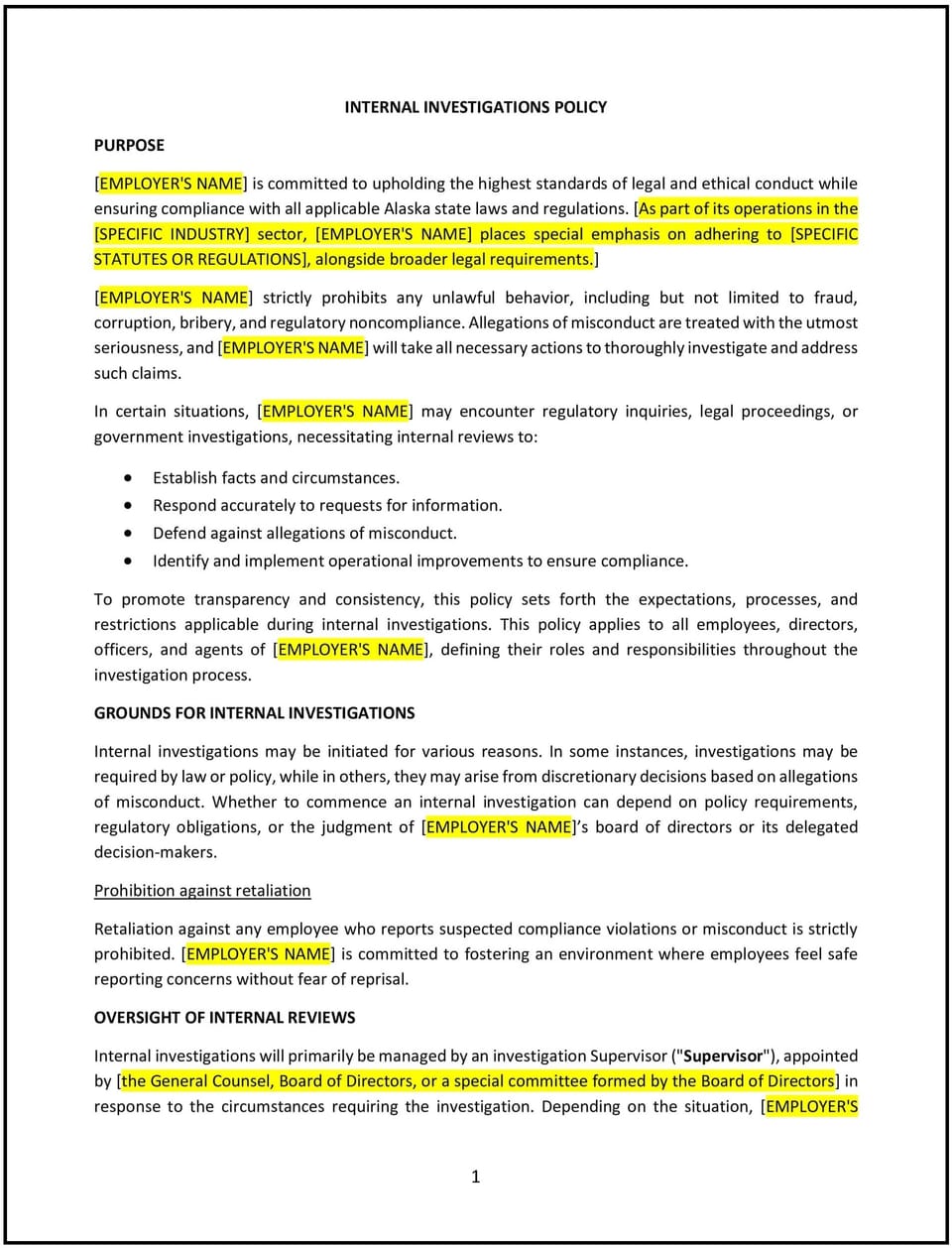Internal investigations policy (Alaska): Free template

Internal investigations policy (Alaska)
In Alaska, an internal investigations policy establishes guidelines for conducting thorough, fair, and consistent investigations into workplace issues, such as misconduct, harassment, or policy violations. This policy ensures that all investigations are handled professionally, respecting the rights of all parties involved while maintaining confidentiality. By implementing this policy, businesses can resolve workplace concerns effectively, minimize legal risks, and promote a culture of accountability.
Given Alaska’s unique challenges, such as small communities and remote operations, businesses should tailor their internal investigations policy to ensure fairness, impartiality, and confidentiality in all workplace settings.
How to use this internal investigations policy (Alaska)
- Define investigation triggers: Clearly outline the types of incidents or complaints that may prompt an investigation, such as employee misconduct or violations of company policy.
- Assign roles and responsibilities: Specify who will conduct investigations, such as HR personnel, managers, or external investigators, depending on the nature and complexity of the issue.
- Include procedural steps: Provide a structured process for handling investigations, including complaint intake, evidence collection, witness interviews, and documentation.
- Emphasize confidentiality: Ensure that all information related to the investigation is handled with care and shared only with those directly involved in resolving the issue.
- Communicate outcomes: Outline how investigation findings will be shared with relevant parties and how any resulting actions will be implemented.
Benefits of using an internal investigations policy (Alaska)
An internal investigations policy offers several advantages for businesses in Alaska. Here’s how it helps:
- Promotes fairness: Ensures all employees are treated equally during investigations, fostering trust and accountability.
- Supports compliance: Helps businesses adhere to federal and state employment laws, reducing the risk of legal disputes or penalties.
- Resolves conflicts efficiently: Provides a clear framework for addressing workplace issues, minimizing disruptions to operations.
- Protects confidentiality: Safeguards sensitive information, preventing unnecessary reputational harm or workplace tension.
- Enhances workplace culture: Demonstrates the company’s commitment to integrity and professionalism, reinforcing employee confidence in leadership.
Tips for using an internal investigations policy (Alaska)
- Tailor to local conditions: Consider Alaska’s small community dynamics when ensuring impartiality and confidentiality during investigations.
- Train investigators: Provide specialized training for managers or HR personnel responsible for conducting investigations to ensure consistency and professionalism.
- Use external resources when necessary: In complex or high-stakes cases, consider engaging external investigators to maintain objectivity.
- Monitor the process: Regularly review and evaluate investigation procedures to identify areas for improvement and ensure compliance with legal standards.
- Address follow-up: Include steps for monitoring the implementation of corrective actions or disciplinary measures resulting from the investigation.
Q: What types of incidents require an internal investigation?
A: Incidents such as harassment, discrimination, policy violations, safety concerns, or financial misconduct typically warrant an internal investigation.
Q: Who should conduct internal investigations?
A: Depending on the issue, investigations can be conducted by HR, managers, or external investigators to ensure impartiality and expertise.
Q: How can businesses maintain confidentiality during an investigation?
A: Limit access to investigation details to those directly involved, store documentation securely, and emphasize confidentiality in all communications.
Q: What steps should an investigation process include?
A: The process should include complaint intake, evidence collection, witness interviews, documentation of findings, and communication of outcomes to relevant parties.
Q: How often should this policy be reviewed?
A: The policy should be reviewed annually or whenever significant changes occur in workplace practices, legal requirements, or company operations.
This article contains general legal information and does not contain legal advice. Cobrief is not a law firm or a substitute for an attorney or law firm. The law is complex and changes often. For legal advice, please ask a lawyer.


